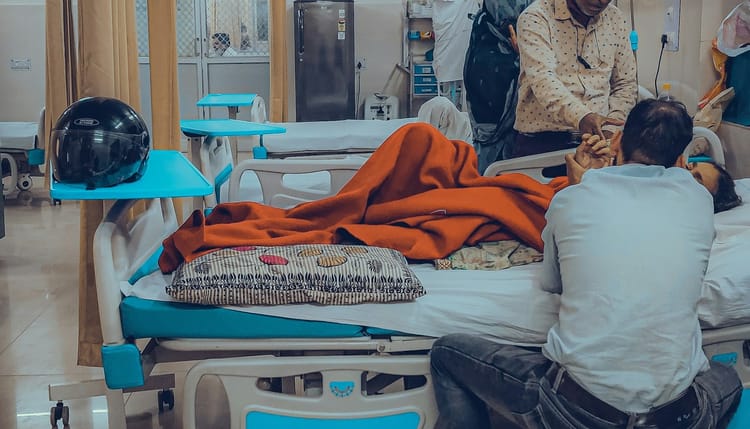Why Your OPD is Full But Your OT is Empty

47 patients in one week.
3 surgeries.
Your colleague down the hall? 28 patients, 12 surgeries.
Same hospital. Same procedures. Same training.
You're losing patients you've already convinced surgery is necessary.
Not because you can't operate. Because you don't know who's ready to hear it.
The Problem Young Surgeons Don't See
Every knee pain patient gets the same consultation from you.
The 65-year-old who doesn't know what's wrong? You discuss TKR.
The informed one evaluating five surgeons? Same TKR discussion.
The one still hoping medicines work? Same approach.
Result: Patients vanish between your consultation room and the operation theatre. Not because you're incompetent - because you're talking surgery to people who aren't ready to hear it.
Here's what I learned after 25 years and watching hundreds of young surgeons make this mistake: Every patient exists in one of three awareness categories. Misread the category, lose the patient.
Understanding the Three Patient Categories
Think about the last 10 patients you saw with knee pain. Some knew exactly what they wanted. Others were just starting to explore options. And some didn't even understand what was wrong.
These aren't random variations - they represent three distinct categories of patient awareness:
Category 1: Unaware of the Problem
"I have knee pain. Probably age-related. Maybe some vitamin deficiency."
Category 2: Aware of Problem, Not Solution
"I have knee arthritis. That's what's causing the pain."
Category 3: Aware of Both Problem and Solution
"I need knee replacement. Just deciding which surgeon."
Most young surgeons treat all three identically - rush through consultation, offer TKR, get confused when patients don't convert. But each category needs a completely different approach.
Let me show you exactly how to handle each one.
Category 3: The Ready Patient (Your Easiest Conversion)
This patient has already been to four doctors. All of them recommended knee replacement. He knows the procedure exists, understands he needs it, and has mentally prepared for surgery.
So why is he in your OPD?
He's not here to learn about the procedure. He's here to evaluate whether YOU are the right surgeon.
This is the most important thing to understand about Category 3 patients: they've already made the surgery decision. What they haven't decided is whether they trust you to do it.
Every question they ask is actually a test of your competence and commitment. But here's where young surgeons get it wrong - they hear the surface question and answer that, missing the real concern underneath.
For example, the patient asks: "Doctor, I've heard many people still have pain even after knee replacement surgery. Is that true?"
Most young surgeons hear this as a question about surgical outcomes. So they respond: "Well, complications can happen, but they're rare" or "Most patients do well if they follow post-op protocol."
Wrong.
What the patient is actually asking is: "If something goes wrong with my surgery, will you take responsibility? Or will you blame me for not following instructions properly?"
The right answer addresses the real concern: "If knee replacement is done properly and you commit to physiotherapy, you won't have chronic pain. There will be pain during recovery - two to three months - but that's normal healing. I've had patients who thought they'd made a mistake in the first month, then at six months they're climbing stairs pain-free. I can give you the number of a previous patient who agreed to speak with others - you can call them directly, I won't interfere. They'll tell you exactly what to expect."
Watch what happens. The patient's shoulders relax. They glance at their spouse with a look of relief.
Another common question: "Doctor, what if I have severe pain on a Friday when you're not in the hospital?"
Surface level: They're asking about weekend coverage.
Real question: "Will you actually show up when I need you, or am I just another case number?"
The answer that converts: "The duty doctor will assess you first if I'm not physically present. But the nurses have my number. If there's anything concerning, they'll call me immediately. I live close to the hospital. I'll come in even on a Friday or weekend if you need me. You're not going to be left alone to figure things out."
That's it. That's all Category 3 patients need. They're not looking for the best technical surgeon or the most experienced one. They're looking for someone who will take responsibility for their outcome.
This patient converts easily - but only if you recognise they're testing your commitment, not your knowledge.
Category 2: The Informed Patient (Needs Guidance, Not Sales)
"I have knee arthritis, doctor. I've been taking medicines but the pain keeps coming back."
This patient knows their diagnosis. They understand what's causing their pain. But they have no idea that surgery is an option - or if they've heard about it vaguely, they're not ready to consider it yet.




